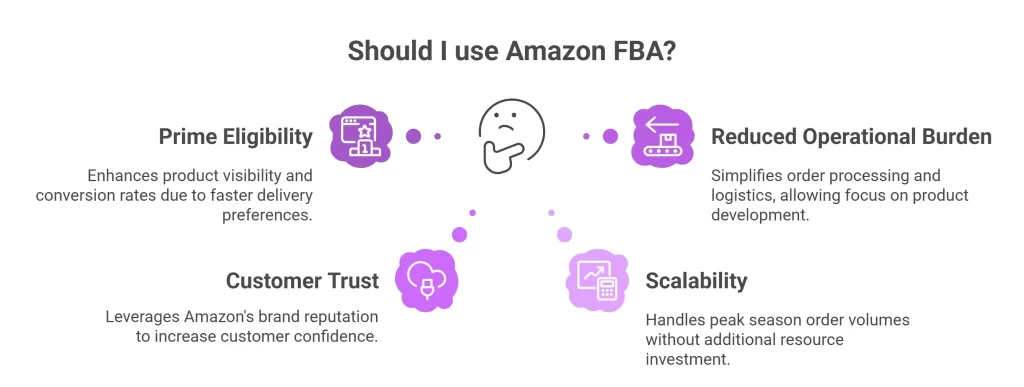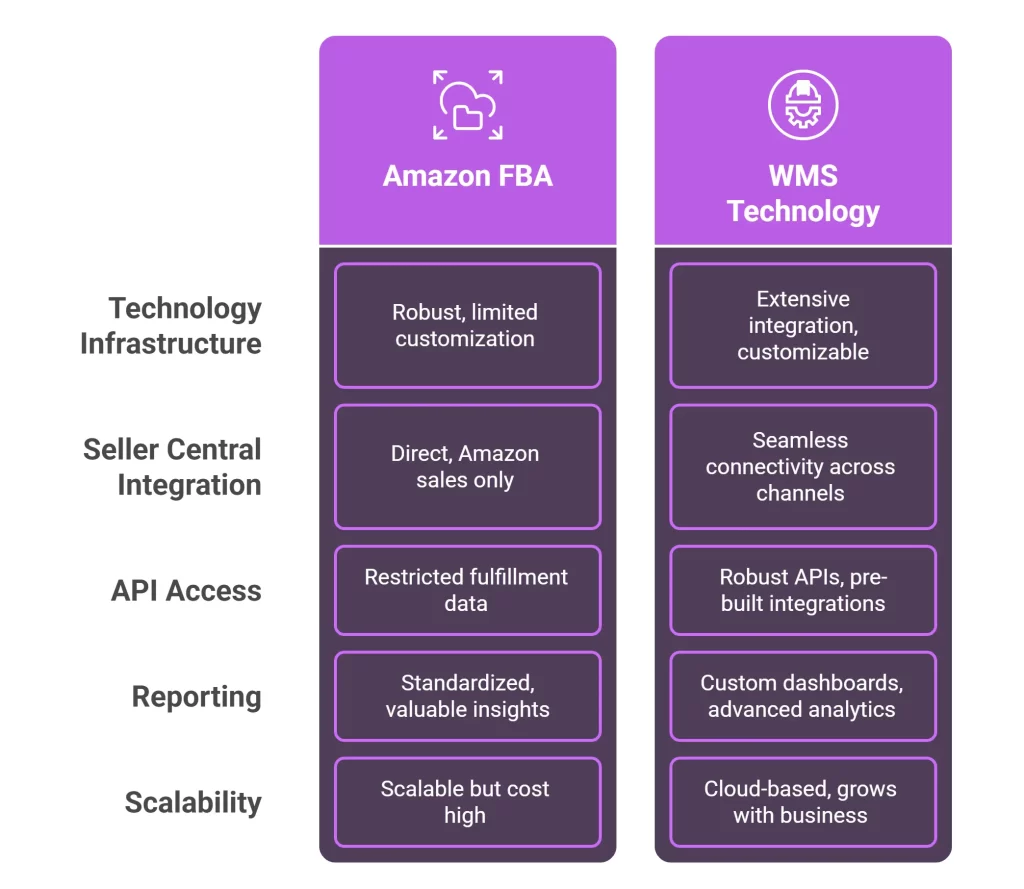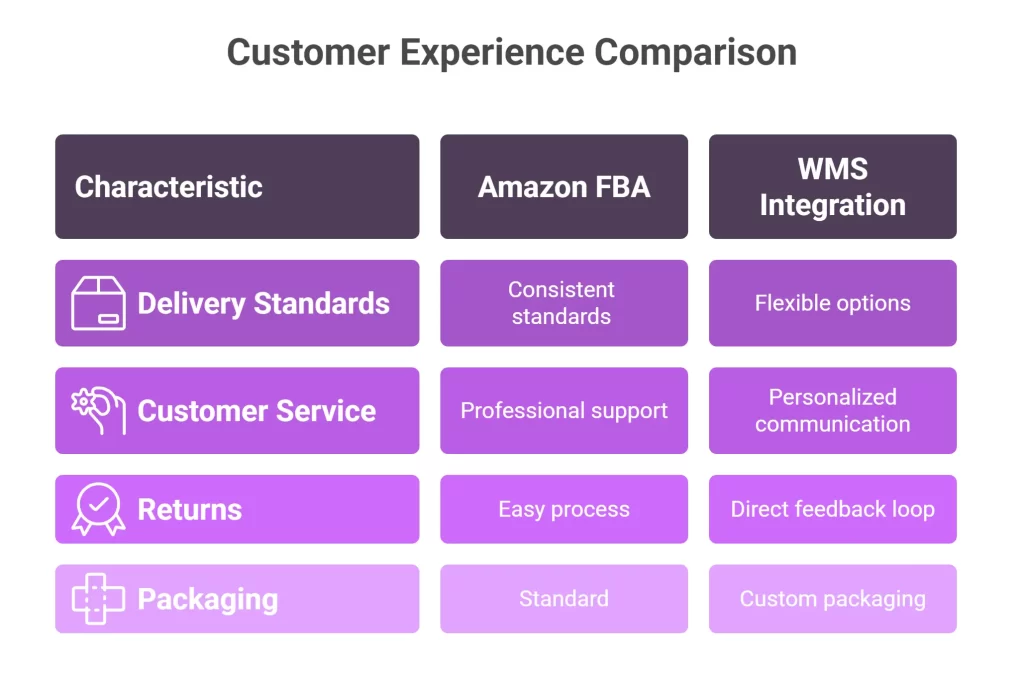Picture this: You’re an Indian seller who just landed a massive order from a customer in Bangalore, but your inventory is sitting in a warehouse in Mumbai. How do you get that product delivered quickly and cost-effectively? This scenario plays out thousands of times daily for Amazon sellers across India, and the solution you choose can make or break your business.

The eternal debate between Amazon FBA vs WMS integration isn’t just about logistics—it’s about choosing the right foundation for your ecommerce empire. According to recent industry data, 73% of Indian ecommerce businesses that implemented advanced WMS solutions reported a 25-40% reduction in operational costs within the first year Whether you’re a startup selling handmade crafts or an established brand moving thousands of units monthly, understanding Amazon fulfillment vs warehouse management options is crucial for your success in the competitive Indian marketplace.
In this comprehensive guide, we’ll dive deep into both solutions, helping you make an informed decision that aligns with your business goals, budget, and growth aspirations. Let’s explore which path leads to sustainable success for Indian sellers in today’s dynamic ecommerce landscape.
Understanding Amazon FBA: The Basics
What is Amazon FBA?
Amazon FBA (Fulfillment by Amazon) is a service where Amazon handles storage, packaging, shipping, and customer service for your products. Think of it as having Amazon’s massive logistics network at your disposal without building your own infrastructure.
When you choose FBA, you send your inventory to Amazon’s fulfillment centers across India. When a customer places an order, Amazon picks, packs, and ships the product on your behalf. They also handle returns and provide customer support, making it an attractive Amazon seller fulfillment option for many businesses.
Key Benefits of Amazon FBA for Indian Sellers
Prime Eligibility: Your products automatically become eligible for Amazon Prime, which significantly boosts visibility and conversion rates. Indian customers increasingly prefer Prime-eligible products for faster delivery.
Reduced Operational Burden: No need to worry about order processing automation, packaging materials, or shipping logistics. Amazon handles the entire fulfillment process, allowing you to focus on product development and marketing.

Customer Trust: Amazon’s brand reputation extends to your products, increasing customer confidence and potentially reducing return rates.
Scalability: During peak seasons like Diwali or Big Billion Days, Amazon’s infrastructure can handle sudden spikes in order volume without you investing in additional resources.
Understanding WMS Integration: The Alternative Approach
What is a Warehouse Management System?
A Warehouse Management System (WMS) is software that helps you manage your own fulfillment operations. Instead of relying on Amazon’s infrastructure, you maintain control over your inventory, storage, and shipping processes while integrating with various platforms and marketplaces.
WMS for Amazon sellers India offers a different approach—you keep your products in your own warehouse or with a third-party logistics provider, but use sophisticated software to manage operations efficiently.
Industry research shows that businesses using integrated WMS solutions like Omneelab WMS experience 35% faster order processing times and 28% improvement in inventory accuracy Core Components of WMS Integration
Inventory Synchronization Tools: Real-time tracking across multiple sales channels ensures you never oversell or run out of stock unexpectedly.
Order Processing Automation: Automated workflows route orders to the appropriate fulfillment location and generate shipping labels without manual intervention.
Multi-Channel Integration: Sell simultaneously on Amazon, Flipkart, your own website, and other platforms while maintaining centralized inventory control.
Performance Analytics: Detailed insights into inventory turnover rates, order accuracy metrics, and customer satisfaction scores help optimize operations continuously.
Cost Analysis: Amazon FBA vs WMS Integration
Amazon FBA Costs in India
Understanding Amazon FBA costs India is crucial for making an informed decision. The fee structure includes several components:
Storage Fees: Charged monthly based on the volume of inventory stored in Amazon’s fulfillment centers. Rates vary by season, with higher fees during peak periods.
Fulfillment Fees: Per-unit charges based on product size, weight, and shipping distance. These fees have increased over time, impacting profit margins for many sellers.
Long-term Storage Fees: Additional charges for inventory that sits in Amazon’s warehouses for extended periods, encouraging faster inventory turnover.
Return Processing Fees: Charges for handling returned items, which can add up quickly for categories with high return rates.

WMS Integration Investment
Initial Setup Costs: WMS software licensing, integration development, and staff training require upfront investment but offer long-term control.
Ongoing Operational Expenses: Warehouse rent, staff salaries, packaging materials, and shipping costs need careful budgeting and management.
Technology Maintenance: Regular software updates, system maintenance, and potential customizations require ongoing investment in technology infrastructure.
Scalability Investments: Growing businesses need additional warehouse space, staff, and technology upgrades to handle increased volume.
Recent market analysis indicates that sellers using comprehensive WMS platforms report 42% better profit margins compared to FBA-only operations after reaching 1,000+ monthly orders Operational Control and Flexibility
Amazon FBA: Convenience vs. Control
With Amazon FBA, you trade control for convenience. While Amazon handles logistics efficiently, you have limited influence over packaging, shipping methods, or customer communication during the fulfillment process.
Standardized Processes: Amazon’s standardized approach ensures consistency but may not align with your brand’s unique requirements or customer expectations.
Limited Customization: Packaging options are restricted, making it challenging to create memorable unboxing experiences that strengthen brand loyalty.
Dependency Risks: Policy changes, fee increases, or account suspensions can significantly impact your business operations without much recourse.
WMS Integration: Maximum Control
Brand Consistency: Complete control over packaging, inserts, and customer communication ensures every touchpoint reinforces your brand identity.
Flexible Operations: Adapt quickly to changing business needs, seasonal demands, or special promotional requirements without external constraints.
Direct Customer Relationships: Maintain direct communication with customers throughout the fulfillment process, building stronger relationships and gathering valuable feedback.
Custom Workflows: Design fulfillment processes that align perfectly with your business model, whether that’s same-day delivery, gift wrapping, or specialized handling requirements.
Multi-Channel Selling Capabilities
Amazon FBA Limitations
Amazon FBA primarily serves Amazon orders, limiting your ability to fulfill orders from other marketplaces or your direct-to-consumer channels efficiently.
Platform Restrictions: Using Amazon inventory for non-Amazon orders violates FBA terms of service, forcing you to maintain separate inventory pools.
Limited Integration: Connecting FBA with other sales channels requires complex workarounds and often results in inventory management challenges.
WMS Multi-Channel Advantages
Unified Inventory Management: Sell across Amazon, Flipkart, Myntra, your website, and offline channels while maintaining centralized inventory control.
Optimized Allocation: Intelligent algorithms determine the best fulfillment location for each order, minimizing shipping costs and delivery times.
Synchronized Stock Levels: Real-time inventory updates across all channels prevent overselling and maintain accurate stock information everywhere.
Channel-Specific Customization: Tailor fulfillment processes for different platforms while maintaining operational efficiency and cost control.
Advanced WMS solutions like Omneelab WMS enable seamless multi-channel operations, with studies showing that businesses using integrated WMS platforms achieve 67% better inventory turnover rates across all sales channels Technology Integration and Automation
Amazon FBA Technology Stack
Amazon provides robust technology infrastructure, but customization options are limited. Their systems integrate seamlessly with Seller Central but may not connect well with your other business tools.
Seller Central Integration: Direct connection with Amazon’s platform provides real-time order and inventory information for Amazon sales only.
Limited API Access: Restricted access to detailed fulfillment data makes it challenging to integrate with comprehensive business intelligence systems.
Standardized Reporting: Amazon’s reports provide valuable insights but may not include all the metrics your business needs for optimization.

WMS Technology Flexibility
Modern warehouse management systems offer extensive integration capabilities and customization options to match your specific business requirements.
API-First Architecture: Connect with any platform, marketplace, or business tool through robust APIs and pre-built integrations.
Custom Dashboards: Create personalized views of your operations with the metrics that matter most to your business success.
Advanced Analytics: Deep dive into performance data, identify trends, and make data-driven decisions to optimize operations continuously.
Scalable Infrastructure: Cloud-based solutions grow with your business without requiring significant infrastructure investments.
For businesses using platforms like Shopify or WooCommerce, WMS integration provides seamless connectivity across all your sales channels.
Customer Experience and Service Quality
Amazon FBA Customer Experience
Amazon’s reputation for reliable delivery and customer service extends to FBA products, potentially improving customer satisfaction and reducing seller workload.
Consistent Delivery Standards: Customers know what to expect from Amazon’s delivery service, reducing anxiety and increasing purchase confidence.
Professional Customer Service: Amazon’s trained support team handles customer inquiries and issues, maintaining service quality standards.
Easy Returns Process: Streamlined return procedures encourage purchases by reducing perceived risk for customers.

WMS Customer Experience Control
With WMS integration, you control every aspect of the customer experience, from order confirmation to delivery and beyond.
Personalized Communication: Send branded emails, SMS updates, and delivery notifications that reinforce your brand identity.
Flexible Delivery Options: Offer same-day delivery, scheduled delivery, or pickup options based on customer preferences and local capabilities.
Custom Packaging: Create memorable unboxing experiences with branded packaging, personalized notes, or promotional materials.
Direct Feedback Loop: Collect customer feedback directly, enabling rapid improvements and stronger customer relationships.
Scalability and Growth Considerations
Amazon FBA Scalability
Amazon’s infrastructure can handle significant volume increases, but scaling with FBA comes with increasing costs and reduced profit margins.
Automatic Scaling: Amazon’s fulfillment network automatically accommodates volume increases during peak seasons or promotional periods.
Geographic Expansion: Access to Amazon’s pan-India network enables quick expansion to new markets without infrastructure investment.
Cost Scaling Challenges: As volume increases, FBA fees can consume larger portions of profit margins, potentially limiting growth sustainability.
WMS Scalability Planning
Controlled Growth: Scale operations at your own pace, investing in infrastructure and technology as revenue grows and justifies expansion.
Flexible Infrastructure: Choose between owned warehouses, third-party logistics providers, or hybrid models based on business needs and financial capacity.
Technology Evolution: Upgrade systems and processes gradually, ensuring each investment contributes to long-term operational efficiency and profitability.
Market Expansion: Enter new geographic markets or sales channels strategically, with full control over timing and resource allocation.
Making the Right Choice for Your Business
When Amazon FBA Makes Sense
Early-Stage Businesses: If you’re just starting and want to focus on product development and marketing rather than logistics, FBA provides immediate access to professional fulfillment services.
Limited Capital: Businesses with restricted upfront investment capacity can leverage Amazon’s infrastructure without significant initial costs.
Amazon-Focused Strategy: If Amazon represents your primary sales channel and you’re comfortable with platform dependency, FBA offers seamless integration.
Simple Product Lines: Businesses with straightforward products that don’t require special handling or custom packaging may find FBA sufficient.
When WMS Integration is Superior
Multi-Channel Ambitions: Businesses selling across multiple platforms or planning omnichannel expansion benefit from centralized inventory management and fulfillment control.
Brand Building Focus: Companies prioritizing brand experience and customer relationship building need the control that WMS integration provides.
Complex Operations: Businesses with specialized products, custom packaging requirements, or unique fulfillment needs require operational flexibility.
Long-term Profitability: Companies focused on sustainable profit margins and operational efficiency often find WMS integration more cost-effective as they scale.
Data shows that 89% of businesses that switched from FBA-only to integrated WMS solutions like Omneelab WMS reported improved customer satisfaction scores within six months.
Future Trends and Considerations
Evolving Ecommerce Landscape
The Indian ecommerce market continues evolving rapidly, with new platforms, customer expectations, and technology solutions emerging regularly. Digital transformation solutions are becoming essential for staying competitive.
Omnichannel Expectations: Customers increasingly expect seamless experiences across online and offline channels, favoring businesses that can deliver consistent service everywhere.
Sustainability Focus: Environmental concerns are driving demand for sustainable packaging and local fulfillment options, areas where WMS integration offers more flexibility.
Technology Integration: AI, machine learning, and IoT technologies are revolutionizing supply chain management, offering new opportunities for optimization and efficiency.
For businesses looking to future-proof their operations, understanding last-mile delivery integration becomes crucial for maintaining competitive advantage.
Preparing for the Future
Flexibility First: Choose solutions that can adapt to changing market conditions, customer expectations, and technology advances.
Data-Driven Decisions: Invest in systems that provide comprehensive data and analytics for informed decision-making and continuous optimization.
Customer-Centric Approach: Prioritize solutions that enhance customer experience and build long-term relationships over short-term cost savings.
Scalable Infrastructure: Select technology and operational models that can grow with your business without requiring complete overhauls.
Conclusion
The choice between Amazon FBA vs WMS integration isn’t just about logistics—it’s about defining your business strategy and growth trajectory. While Amazon FBA offers convenience and immediate access to professional fulfillment services, WMS integration provides the control, flexibility, and long-term profitability that many successful businesses require.
For Indian sellers navigating this decision, consider your current business stage, growth ambitions, and operational priorities. Early-stage businesses might benefit from FBA’s simplicity, while established companies with multi-channel aspirations often find WMS integration more aligned with their strategic goals.
The most successful approach might not be choosing one over the other, but rather understanding how each solution fits into your broader business strategy. Some businesses thrive with a hybrid approach, using FBA for certain products or markets while maintaining WMS control for others.
Ready to optimize your fulfillment strategy? Explore how advanced WMS solutions can transform your ecommerce operations, reduce costs, and improve customer satisfaction. The right technology partner can help you navigate this complex decision and implement a solution that drives sustainable growth for your business.
Frequently Asked Questions
Amazon FBA handles all fulfillment aspects—storage, packaging, shipping, and customer service. You send inventory to Amazon’s centers, and they manage everything. WMS integration uses software to control your own fulfillment operations through your warehouse or third-party providers. Key difference: FBA offers convenience, WMS provides operational control and multi-channel flexibility.
FBA costs: storage fees (₹26-45/cubic foot monthly), fulfillment fees (₹25-180+ per unit), long-term storage, and return charges. WMS costs: software licensing (₹10,000-50,000+ monthly), warehouse operations, staff, and shipping. FBA has predictable per-unit costs; WMS requires higher upfront investment but offers better unit economics at scale (1000+ monthly orders).
Yes! This “Merchant Fulfilled Network” (MFN) approach lets you maintain inventory control while selling on Amazon. You need robust inventory synchronization and order processing automation to match delivery standards. You won’t get automatic Prime eligibility but can maintain better profit margins and competitive delivery times.
WMS integration is superior for multi-channel operations. FBA restricts you to Amazon-only fulfillment—using FBA inventory for other platforms violates terms. WMS enables unified inventory management across Amazon, Flipkart, Myntra, your website, and other channels from a single inventory pool.
Consider: Business Stage (FBA for startups, WMS for established), Sales Channels (FBA for Amazon-only, WMS for multi-channel), Product Complexity (FBA for simple, WMS for custom), Profit Margins, Growth Plans (WMS offers better scalability), and Control needs (WMS for brand building). Start with FBA for immediate fulfillment, plan WMS transition when scaling beyond 500-1000 monthly orders.
People also read:
- WMS for CRED
- WMS for Bewakoof
- WMS for Tata CLiq
- WMS for Snapdeal
- WMS for Nykaa
- JioMart WMS Integration
- Inventory Management with Barcode Technology
- Common Inventory Management Challenges
- WMS for Magento
- What Is a Bill of Materials (BOM)? Expert Guide & Tips

Kapil Pathak is a Senior Digital Marketing Executive with over four years of experience specializing in the logistics and supply chain industry. His expertise spans digital strategy, search engine optimization (SEO), search engine marketing (SEM), and multi-channel campaign management. He has a proven track record of developing initiatives that increase brand visibility, generate qualified leads, and drive growth for D2C & B2B technology companies.